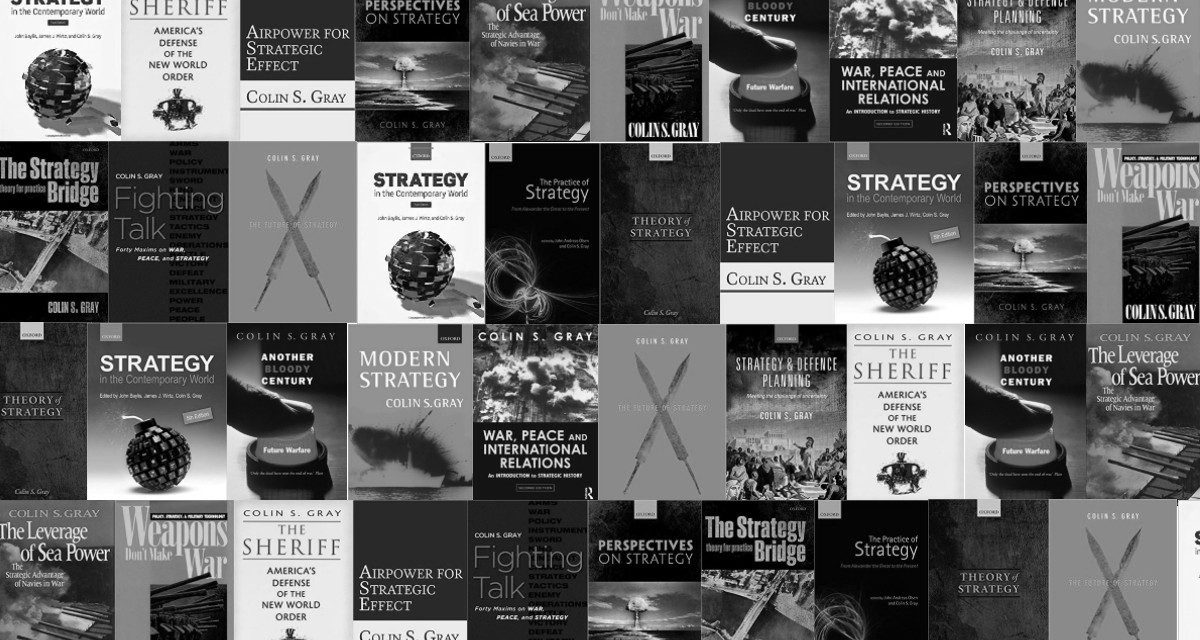Editor’s note: Welcome to another installment of our weekly War Books series! The premise is simple and straightforward. We invite a participant to recommend five books and tell us what sets each one apart. War Books is a resource for MWI readers who want to learn more about important subjects related to modern war and are looking for books to add to their reading lists.
This week’s installment of War Books highlights the works of renowned strategist Colin Gray. February 27 marks the four year anniversary of his death. In addition to the contribution his works made to the community of individuals who study war and strategy, he made an important personal contribution to MWI by donating much of his personal library—thousands of books—to the organization. In this edition of War Books, retired Lieutenant Colonel ML Cavanaugh—a former MWI staff member who was also one of Colin’s PhD students at the University of Reading—highlights several of his books and describes the enduring value they offer to the study of war.
I knew Colin Gray well late in his life. In 2013 I had just finished a two-year master’s program at Victoria University in Wellington, New Zealand, and desperately wanted to continue work toward a PhD. American graduate schools wouldn’t accept my time in New Zealand as a stepping stone to the doctorate, so I cold-emailed Colin at the University of Reading in the UK. Surprisingly, he responded quickly that he liked my proposed topic, and so began five years of study under him (as well as Professor Beatrice Heuser, now at the University of Glasgow). Along the way, Colin retired from Reading, but continued as my advisor in his status as professor emeritus. It’s possible I was his final PhD student.
Colin was as much a writer as he was a thinker. That’s what drew me to him in the first place, and I suspect it’s the same for others. Arguably, nobody’s been so prolific a writer in strategic studies. His contributions are everywhere, and because much of it predates our digital age, much keeps popping up.
Some of his many fans may not know about a couple collections of his in the United States. For many years he wrote an annual manuscript for the Strategic Studies Institute at the US Army War College. And, as of 2019, the Modern War Institute at West Point houses his personal library. An email Colin wrote to me on the matter said he hoped his “written comments in the books add spice” to our debates and discussions.
What follows are just a few of his books that impacted me the most and why they were so impactful. They just scratch the surface, so I encourage others to explore more.
The Strategy Bridge: Theory for Practice
My copy of this book has almost as many post-it notes as pages. It seems like every paragraph pops with some new insight that requires reader notation for future reference. In particular, when I read Colin describe the lack of “careful and deep [study] of the role of the [supreme] commander” as a “prominent” weakness in “modern Western strategic theory,” I took that on as my dissertation subject. Moreover, when Eliot Cohen calls something the “first original and serious work on strategy” of the century, you should check it out.
Strategy & Defence Planning: Meeting the Challenge of Uncertainty
Colin listened to his students, even the greenest greenhorns. While he finished edits on this book, we had a back-and-forth in which I shared with him an essay written by H.R. McMaster from the New York Times. He liked it so much he included it as his opening epigraph. For a student, this was richly rewarding and felt like an actual (if miniscule) contribution toward scholarship in progress.
Strategy in the Contemporary World
Colin coedited (with John Baylis and James J. Wirtz) the finest comprehensive primer on strategic studies series out there, and I’ve benefited from and enjoyed each of the six editions out in publication.
This was my first, and you never forget your first. Because it predates my post-it policy for book preservation, it’s full of marginalia and magnificently ugly green fluorescent markings. I can still flip through it and bump into so many good ideas: the many different dimensions of strategy; a compelling argument that strategy, operations, and tactics aren’t really hierarchical and “not wholly distinctive”; and an explanation of why culture and the human dimension of strategy are often overlooked.
Fighting Talk: Forty Maxims on War, Peace, and Strategy
This slim volume of maxims is Colin’s most efficient ideas-per-page performance. This is where he most directly stated that there “are no new ideas in strategy.” Most writers simply “update the classics for a better fit with contemporary realities.” That said, this one was good enough to land on former Secretary of Defense James Mattis’s professional reading list.
Another short book of Colin’s that made Mattis’s list. He began it by writing, “I am a strategist. For fifty years I have spoken, written and sought to advise [others] about strategy.” While the future of strategy may be murky, one thing is certain—it will forever include the words and works Colin Gray produced over those five decades. And we’re all the better for it.
ML Cavanaugh, PhD, is a retired US Army strategist. A cofounder of the Modern War Institute, he is a professor of practice with the Arizona State University School of Politics and Global Studies. He is also the coeditor of Strategy Strikes Back: How Star Wars Explains Modern Military Conflict and Winning Westeros: How Game of Thrones Explains Modern Military Conflict.
The views expressed are those of the author and do not reflect the official position of the United States Military Academy, Department of the Army, or Department of Defense.


